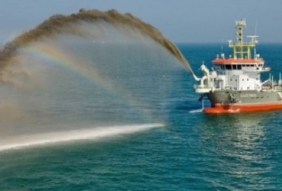
Posted on July 12, 2016
By Sandy Guthrie, KHL
The loss of 24 vessels and 650 jobs worldwide have been announced by dredging and marine infrastructure group Royal Boskalis Westminster, following a fleet rationalisation study announced earlier this year.
When it reported its figures for 2015, in March this year, Boskalis said it was tightening up its fleet and organisation, and was alert to respond to the opportunities the market continued to present – “opportunities in existing market segments as well as opportunities created by adjusting our playing field and extending it to growth markets”.
The rationalisation study, which has now been completed, was said to have been initiated in light of deteriorating market conditions and an expected prolonged period of low energy and commodity prices.
Boskalis said that based on the results of the study, it had been decided to take 24 vessels out of service in the next two years. It added that this would result in the loss of approximately 650 jobs worldwide during this period.
CEO Peter Berdowski said, “After a few very busy years, the market outlook for Boskalis has changed drastically as a result of continuing low energy and commodity prices.”
He said the volume of work in the market had fallen sharply, and this was putting pressure on the rate of use for the company’s vessels.
“Because we expect these market conditions to persist in the coming years,” he said, “it is essential that we adapt the size and composition of our fleet to this new reality.
“We are fully aware that this intended decision is drastic and that it will have a major social impact. While we will try to absorb the workforce reduction through attrition and redeployment wherever possible, compulsory redundancies unfortunately look to be unavoidable.”
He added, “A reduction of the number of vessels and jobs is, however, necessary to ensure that Boskalis remains healthy going forward.”
With the completion of the study, the decision has been made to take the 24 vessels out of service in the 2016 to 2018 period, of which ten will be in the dredging division and 14 at the offshore energy division.
These will include trailing suction hopper dredgers, cutter suction dredgers, anchor handling tugs and heavy transport vessels.
Boskalis said the fleet rationalisation would be implemented through the scrapping, sale and lay-up of vessels. The average age of the vessels earmarked for scrapping or sale is over of 30 years.
It said the approximately 650 employees to be made redundant would be a cross-section of nationalities, with around 150 Dutch staff on Dutch payroll affected.
It said the fleet rationalisation had no implications for Boskalis’ strategy, which was aimed at benefiting from key macroeconomic factors that drive worldwide demand in is markets – expansion of the global economy, increase in energy consumption, global population growth and the challenges associated with climate change.
Source: KHL





